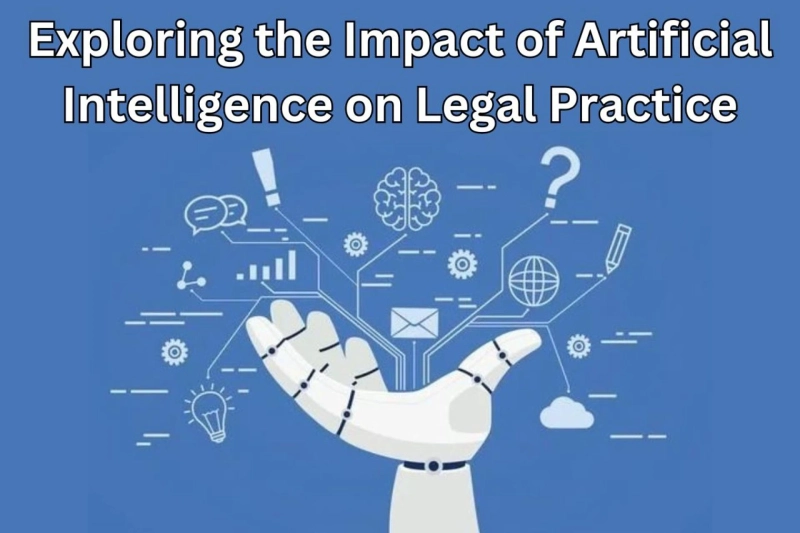In the ever-evolving landscape of legal practice, the integration of Artificial Intelligence (AI) is not just a technological leap but a paradigm shift. From automating routine tasks to enhancing legal research and decision-making, AI is reshaping how legal professionals approach their work. Let's delve into the profound impact of AI on legal practice and its implications for the future.
1. Legal Research Reinvented: The Rise of Cognitive Computing
AI-powered legal research platforms are revolutionizing the way lawyers gather information. Natural Language Processing (NLP) algorithms analyze vast legal databases, rapidly extracting relevant cases, statutes, and precedents. This not only expedites the research process but also empowers legal professionals to uncover nuanced insights and make more informed decisions.
2. Contract Review and Due Diligence: The AI Paralegal
In the realm of contract review and due diligence, AI has emerged as a powerful paralegal assistant. Machine Learning algorithms can scan and analyze large volumes of contracts, identifying key clauses, potential risks, and discrepancies. This not only accelerates the review process but also reduces the likelihood of oversight, enhancing the accuracy of legal assessments.
3. Predictive Analytics in Litigation: Forecasting Legal Outcomes
AI-driven predictive analytics is changing the game in litigation strategy. By analyzing historical case data, machine learning algorithms can predict the potential outcomes of legal disputes. This enables lawyers to make data-informed decisions, assess risks more accurately, and strategize their approach based on statistical probabilities, ultimately enhancing the efficacy of legal representation.
4. Virtual Legal Assistants: Enhancing Productivity
Virtual legal assistants, powered by AI, are becoming indispensable tools for legal professionals. These AI-driven assistants can schedule appointments, draft routine documents, and manage administrative tasks, allowing lawyers to focus on more complex, high-value aspects of their work. The result is increased efficiency and productivity in legal practice.
5. E-Discovery: Taming the Data Deluge
In an era of massive digital data, e-discovery has become a monumental task in legal proceedings. AI streamlines this process by automating document review, categorization, and relevance assessment. By leveraging machine learning algorithms, legal teams can sift through mountains of electronic data more efficiently, saving time and resources in the discovery phase of litigation.
6. Ethical Considerations and Bias Mitigation: The AI Dilemma
While AI brings unprecedented efficiency to legal practice, it also raises ethical concerns. The potential for bias in algorithms and the ethical implications of delegating decision-making to machines are critical considerations. Legal professionals must navigate these challenges, ensuring that AI systems are transparent, accountable, and aligned with ethical standards in the legal profession.
7. Access to Justice: Democratizing Legal Services
One of the transformative aspects of AI in legal practice is its potential to enhance access to justice. Chatbots, powered by AI, can provide preliminary legal information, assist in formulating legal documents, and guide users through legal processes. This democratization of legal services has the potential to bridge gaps in access, making legal resources more widely available.
Conclusion
The impact of AI on legal practice is profound, ushering in a new era where technology complements the expertise of legal professionals. As the legal landscape continues to evolve, the judicious integration of AI holds the promise of not only increasing efficiency and accuracy but also contributing to a more accessible and equitable legal system. Legal minds in the machine era are poised to navigate this transformative journey, where tradition meets technology, and the future of legal practice unfolds with unprecedented possibilities.
FAQs about Artificial Intelligence on Legal Practice
How artificial intelligence will affect the practice of law?
Artificial intelligence is expected to significantly impact the practice of law by automating routine tasks, improving legal research, enhancing document review processes, providing predictive analytics for case outcomes, and increasing overall efficiency in legal operations.
How is artificial intelligence used in the legal field?
Artificial intelligence is used in the legal field for tasks such as legal research, document review, contract analysis, predictive analytics for case outcomes, and automation of routine administrative functions, enhancing overall efficiency and accuracy in legal operations.
What are the legal issues with artificial intelligence?
Legal issues related to artificial intelligence include concerns about data privacy, transparency, bias in algorithms, accountability for AI decisions, intellectual property rights, potential job displacement, and the need for updated regulations to address the unique challenges posed by AI technologies. Addressing these issues requires a careful examination of ethical and legal frameworks to ensure responsible AI development and deployment.
What are the ethical challenges from artificial intelligence to legal practice?
Ethical challenges in legal practice related to artificial intelligence include concerns about bias in AI algorithms, the transparency of decision-making processes, data privacy and security, accountability for AI-generated decisions, and the potential impact on employment in the legal profession. Addressing these challenges requires a commitment to ethical AI development, ongoing scrutiny, and the establishment of clear guidelines within the legal community.
Also read
data analytics courses chennai
best data science institute in india



